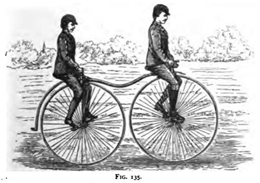 Two Neanderthals need a bow and some arrows. Grrmt can build a bow in 5 hours and arrows in 4 hours. Aaaargl can build a bow in 2 hours and arrows in 3 hours. Thus, in order to build what they need, Grrmt will take 5+ 4 = 9 hours, and Aaaargl will take 2 + 3 = 5 hours. 14 hours total will be spent by the both of them.
Two Neanderthals need a bow and some arrows. Grrmt can build a bow in 5 hours and arrows in 4 hours. Aaaargl can build a bow in 2 hours and arrows in 3 hours. Thus, in order to build what they need, Grrmt will take 5+ 4 = 9 hours, and Aaaargl will take 2 + 3 = 5 hours. 14 hours total will be spent by the both of them.
Now what happens if our primitive friends talk to each other, specialize in what they do best, and trade? Something extraordinary. Aaaargl should have no interest doing that, as he's faster than Grrmt in everything, right? Right?
Wrong. If they each specialize on what they do best, Grrmt will have to build two sets of arrows in 8 hours, and Aaaargl will have to build two bows in 4 hours. Grrmt and Aaaargl both saved one hour. Both of them, even "faster at everything" Grrmt, because he was allowed to focus on what he's fastest at being faster.
If they compete, Grrmt and Aaaargl both lose. If they collaborate with each other, they both win. Competition can be detrimental to everyone? Who would have known? And this is without even taking into account that by specializing, one naturally gets better, and one can industrialize processes.
Of course, competition comes with its own dynamics of supply and demand that we've all been taught. But is competition really beneficial and stable? The supplier's interest is in the prices being as high as possible. He can achieve that by organizing scarcity. But how does he organize scarcity if he's competing in a free market? Why, by eliminating competition and becoming a monopoly of course... In other words, we have one agent in each transaction whose best interest is to eliminate competition, and the other whose interest is to maximize competition but that has practically no means of doing that, except for the collective control of governmental anti-trust laws. If left to evolve on its own, a competitive system spontaneously decays into the elimination of competition.
Every single year that I've attended the Microsoft company meeting, I've seen Ballmer jumping around the stage and getting borderline hysterical about being number one of this, becoming number one of that, and generally poo-poo-ing the competition. It's only natural: suppliers want to become monopolies, they want to control the market so that they can impose their prices.
Now look at a farmer's market. Do the cheese sellers there want to crush each other and dominate the world market of Gouda? Most of them don't, but they still do fine because they act locally, without excessive greed and in a collaborative environment. In this sense, it's not between the cathedral and the bazaar that there is a contention, it's between the bazaar and Wal-Mart.
One often talks about "competitive advantage". But there is also a collaborative advantage! Competition makes losers, that's inevitable, but collaboration makes it possible for everybody to win.
Open Source, by its very nature, is the ultimate collaborative mechanism. It eliminates competition, not by crushing it, but by replacing it with sharing and emulation. It makes sure that there is always a way out of monopolistic situations. It replaces the advantage of exclusive assets with the advantage of know-how.
Above all, it replaces top-down innovation with network innovation. What we are finding out is that many connected small structures are often better at innovating than a few big ones.
If Apple comes up with something brilliantly designed (as it often does), Microsoft's first reaction is fear, and then it is to move a few hundred engineers to the project of reproducing and improving on the idea, which usually takes at least two years, and gives mixed results. This is a reactive, sluggish and inefficient approach to innovation.
In Open Source, when a new innovation appears, it's never met with fear but rather with enthusiasm. Reactions vary from "wow, that's neat, and it solves my problem exactly, I'll just use it" to "wait a minute, that gives me a great idea". When an improvement is made, it's contributed back, and everybody wins. It's a much saner, productive and efficient way to innovate.
Of course, Open Source has its lot of problems, but it's nothing that good engineers can't work with.
It started with software, but it's spreading fast. The Maker and Open Source Hardware movement are another step, but we also see forms of crowd sourcing appearing everywhere in society: health, news, literature, encyclopedias, science have already jumped on that train. but I think there is another domain where this wind of freedom and collaboration must spread, and that is democracy. I don't expect that to appear first in the old Western democracies, but rather in all those countries that are awakening from the deep nightmare of dictatorship, and where everything remains to be invented.